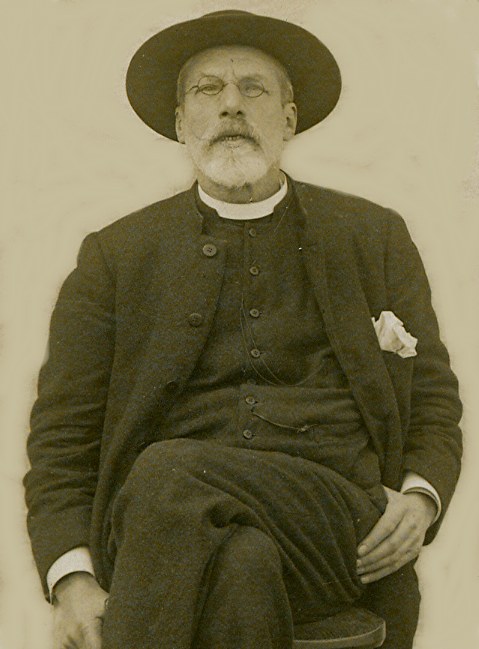Revd Charles Dowding.
Vicar of St John’s-in-the-Vale, 1898-1906
Charles Dowding was vicar of St John’s-in-the-Vale from 1898 to 1906. He
succeeded the Revd Robert Vaughan who left the parish on November 14th,
1897. There was thus, a short interregnum.
Dowding was vicar of St John’s-in-the-Vale from 1898 to 1906. He
succeeded the Revd Robert Vaughan who left the parish on November 14th,
1897. There was thus, a short interregnum.
Charles Dowding was chosen as vicar by a meeting of Ratepayers of the parish out of a field of eight. This was reduced to three people, and each of these came to meet the churchwardens. They were individually conducted round the parish before the meeting.
Charles Dowding’s address was given as Lyndhurst, High Wycombe, and it was said at the meeting when his name was put forward, that ‘he had been strongly recommended to the Bishop of Carlisle by Canons Bower and Sherwen.’ Perhaps they were canons of Carlisle Cathedral.
The Revd A J Heelis, who was present at the meeting, said that he could corroborate the recommendations from personal knowledge of Mr Dowding, whom he knew in his first curacy. As further recommendation, the Churchwarden who chaired the meeting said that ‘personally, he came to the conclusion that Mr Dowding was the most likely man; he was the strongest to look at. The parish is a very scattered one and required a good deal of walking, and in wild stormy weather, a strong man only would be able to answer a call to attend a case of sickness.’ He proposed the election of Charles Dowding.
The Seconder to the motion, Mr Marshall (I think he was the Lord of the Manor of Castlerigg and Derwentwater), who had had an interview with Mr Dowding, found him ‘to be a good walker, an educated gentleman, whom he believed to be in earnest in his wish to take the place and do his duty’.
There was no counter proposal, and he was elected unanimously. He stayed for only eight years, but in that time he made his mark. One thing he did was to make quite detailed notes in the church register of services. He recorded the weather each Sunday and made a note of the temperature. Here are some of his comments:-
Nov 26th, 1905. “No service. Exacrably (sic) wild and wet.”
Nov 13th 1906. “A fine but a dull day. The wedding party were some of them injured in a carriage accident near Beckthorns in the afternoon.”
Two days later he writes: “A pouring wet day (43 degrees). As to the accident, all were thrown out. They got off easy, owing to the horses breaking away. The road is dangerously narrow.”
Charles Dowding resigned the living in 1906, and his last comment was,
‘My last service as Vicar. I resign on Friday, Nov 30th.’
It is pleasing to note that 69 people came to Evensong to wish him goodbye.
A major achievement of his time as vicar was to have the vicarage enlarged. The house had been built in 1856-7, shortly before the chapelry (a part of the large ancient parish of Crosthwaite, Keswick)became a fully fledged parish in its own right in 1863. In 1898, Charles Dowding sent out a printed appeal for funds to help in the enlargement of the vicarage. The appeal was circulated to parishioners and friends of the parish. The Bishop contributed a letter, and the churchwardens and the Rural Dean (the famous Canon Hardwick D. Rawnsley, one of the founders of the National Trust) who was vicar of Crosthwaite, explained the need. It was said that Charles Dowding had already taken the trouble to ‘better the present house and plant an orchard.’ They went on to say, ‘The parishioners, who are neither rich nor poor cannot give much money, but we are confident that most, if not all the carting of materials, will be done free by them, as it was when the vicarage was first built in 1857, and this is not an inconsiderable item, seeing that a horse and cart and man cost between seven and eight shillings a day.’ Clearly, the vicar had the support of his parishioners in what he was doing. The Rural Dean gave reasons for the extension: ‘The vicarage is inadequate in accommodation for the present, and, I think for its future tenants, and is lacking in necessary offices also.’ The cost was thought to be between £500 and £600, and Mr Dowding undertook to raise part of this.
Reading between the lines, one supposes that the Dowdings had a large family. This was corroborated in 2009 in a letter from his grandson, Stuart Dowding, who said that he had seven children, Charles, Eda, Geoffrey, Owen, Honor, Rosamund and Kathleen.
In 1963, Miss Eda d’E Dowding, daughter of Charles Dowding wrote about the building work done under her father. She well remembered that the family moved to Helvellyn Street in Keswick while work proceeded. She was seven years old at the time, so was about 72 years old when she wrote, and must have been born in 1893, before the family moved to St John’s.
Charles Dowding strikes one as being a man of impressive presence with decided views, which he was not afraid to express. For instance, his comment in the churchwardens’ minutes of Whitsunday,1899, on the regular giving out of charitable gifts to parishioners:-
‘The vicar and churchwardens distribute these loaves, and the above (people) presented themselves as recipients, but from habit, not from need. The loaves have to be given away, and recipients are needed, but as marking the improved condition of “the poor”, since the time this Charity was left, it may be stated without fear, that no man, woman or child goes short of food from year’s end to year’s end in this parish unless it be from gross incompetence on the part of the wife.’